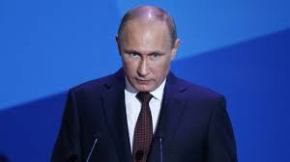In cooperative action, even where all agree on the goal and have an equal interest in the project, one cannot rely on others. (Waltz, 1959)
The Russian President Vladimir Putin is well known for his piercing speeches that some times leave a loud effect in the international relations media, drawing attention to the figure of the president and his world power intentions. In this paper I want to analyse two of Putin’s speeches: Munich 2007 and Valdai 2013.
What is striking about these two “speech acts” is the transformation of the discourse that in the first speech resembles the realist approach to international relations and the latter invokes to cultural, deconstructivist ideas.
By the time of Munich Conference on Security Policy Putin was portrayed as a man of war: piloting fighter gets, leading the war in Chechnya and building authoritative army-like structure of power exempt from morality.
Putin was the personification of the new Russian might that was coming to emerge on the international scene. And for Putin image of might and force was a resource “… of achieving the external ends of states because there exists no consistent, reliable process of reconciling the conflicts of interests that inevitably arise among similar units in a condition of anarchy. A foreign policy based on this image of international relations is neither moral nor immoral, but embodies merely a reasoned response to the world about us”. (Waltz, 1959)
In his Munich speech V.V. Putin quoted Franklin D. Roosevelt, saying “security for one is security for all”. However his speech was more about security of oneself against the security (or rather insecurity) of the one. He was talking about the vices of the hegemon (i.e. USA, coupled with the NATO’s eastward expansion) and what it represents: “… one center of authority, one center of force, one center of decision-making”.
For the Russian President the unipolar model is not only unacceptable but also impossible in today’s world. The world the Putin envisages is a Waltzian (Hobbesian if you wish) world: “…no one feels safe. I want to emphasize this — no one feels safe! Because no one can feel that international law is like a stone wall that will protect them. Of course such a policy stimulates an arms race”.
However, Russian president provides a solution – the UN. Although many see the UN Security Council as a dead end, especially because of Russian veto practices that stall any intentions to improve a conflict situation.
In his final remarks the President touched on Russia’s history as being an independent foreign policy actor and that Russia is not going to change that thousand years old tradition.
More on traditions, identities and culture was said by the President on 12 August 2013 at the Valdai Conference.
At Valdai the narrative of hegemony was still there, however the question of morals, values and tradition was reinvigorated.
History and ‘us’ were Valdai’s main keywords. It was from history that Putin wanted to find an inspiration for new policies and ideas: “our entire, uncensored history must be a part of Russian identity. Without recognizing this it is impossible to establish mutual trust and allow society to move forward”.
Hegemony was given a new spin. It is not only unacceptable and unfeasible, it is also against God: “… a unipolar, standardized world does not require sovereign states; it requires vassals. In a historical sense this amounts to a rejection of one’s own identity, of the God-given diversity of the world”.
This time, unlike five years ago Putin appeals not to the UN but to his own country, or rather country he wants to construct. For him “it was evident that it is impossible to move forward without spiritual, cultural and national self-determination”.
At this point Putin was entering the realm of vague ideal and mythical world not of Waltz, but of Wendt, Lebow, Lapid and Chakrabarti. According to the latter “political communities are essentially mythological, we know how these myths have very real expression in social life. The success of historical arguments for unity/identity lies in appropriate use of cultural symbols and imagery that come to (1) serve as referents for that unity and identity and (2) symbolically represent that ‘community’. (Chakrabarti, 1997)
Putin acknowledges that “… identity and a national idea cannot be imposed from above, cannot be established on an ideological monopoly”.
We hear a very interesting message, something of a great value for the IR theory. Putin talks about “historical creativity” and “synthesis of the best national practices and ideas, an understanding of our cultural, spiritual and political traditions form different points of view” that ultimately will have to result in policy. In years to come policy will have an effect on political reality and discourse (historical as well) on that reality, hence reproducing ideological constructs and completing the full cycle of history-idea-policy-history.
Finally, “the year 2014 has been declared the Year of Culture in Russia. It is intended to be a year of enlightenment, emphasis on our cultural roots, patriotism, values and ethics”. We’ll see what the future and the presidential administration bring.
Apart form creation of myths and synthesis of ideas one remains hopeful to the presidential word of Valdai 2013: “we must treasure every individual”.
London 2013
